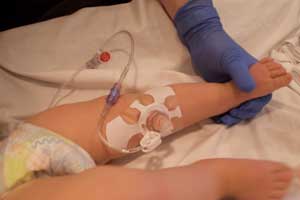- Home
- Editorial
- News
- Practice Guidelines
- Anesthesiology Guidelines
- Cancer Guidelines
- Cardiac Sciences Guidelines
- Critical Care Guidelines
- Dentistry Guidelines
- Dermatology Guidelines
- Diabetes and Endo Guidelines
- Diagnostics Guidelines
- ENT Guidelines
- Featured Practice Guidelines
- Gastroenterology Guidelines
- Geriatrics Guidelines
- Medicine Guidelines
- Nephrology Guidelines
- Neurosciences Guidelines
- Obs and Gynae Guidelines
- Ophthalmology Guidelines
- Orthopaedics Guidelines
- Paediatrics Guidelines
- Psychiatry Guidelines
- Pulmonology Guidelines
- Radiology Guidelines
- Surgery Guidelines
- Urology Guidelines
Sepsis care within an hour associated with reduced mortality in children: JAMA

The chances of survival are increased considerably in children hospitalized with sepsis when a series of clinical treatments and tests (sepsis bundle) is completed within an hour of its detection. The study, published in the journal JAMA holds importance considering the fact that more than one in 10 children hospitalized with sepsis die.
Christopher W. Seymour, associate professor, Department of Critical Care Medicine, University of Pittsburgh School of Medicine, Pittsburgh, Pennsylvania, and colleagues conducted the study to determine the risk-adjusted association between completing the 1-hour pediatric sepsis (PS) bundle and individual bundle elements with in-hospital mortality.
“No child should die from a treatable infection,” said Dr. Seymour. “This is the best evidence to date that prompt identification and treatment of suspected sepsis leads to better outcomes in children.”
Sepsis is a condition that arises when the body's response to an infection injures its own tissues and organs. The condition of the children with sepsis deteriorates particularly quickly -- looking relatively healthy one moment and needing life support within hours.
For the study, the research team analyzed the outcomes of 1,179 children with sepsis reported at 54 New York hospitals. The children had an average age of just over 7 years, and 44.5 percent were healthy before developing sepsis. A total of 139 patients died.
Also Read: Manage critical first hour of Sepsis on war footing-SSC Update
Key Findings:
- Completion of the sepsis protocol within one hour decreased the odds of death by 40 percent.
- When only parts of the protocol were completed within an hour – for example, giving fluids but not testing for infection or giving antibiotics – the patients did not fare better.
- The finding held only if the entire protocol was completed in an hour.
The findings support the current recommendations from the American College of Critical Care Medicine for care and treatment of PS.
“It’s clear that completing the entire sepsis protocol within an hour is associated with lower mortality,” said lead author Idris V.R. Evans, M.D., assistant professor in Pitt’s Department of Critical Care Medicine. “But the mechanism of benefit still requires more study. Does each element of the protocol contribute to specific biologic or physiologic changes that, when combined, improve outcomes? Or is it that completion within an hour may simply be an indication of greater awareness by doctors and nurses caring for the child? Or could it be something else entirely?”
"Our findings demonstrate that completion of a sepsis bundle within 1 hour compared with not completing the 1-hour sepsis bundle within 1 hour was associated with lower risk-adjusted in-hospital mortality among patients with pediatric sepsis and septic shock," concluded the authors.
For further information log on to 10.1001/jama.2018.9071

Disclaimer: This site is primarily intended for healthcare professionals. Any content/information on this website does not replace the advice of medical and/or health professionals and should not be construed as medical/diagnostic advice/endorsement or prescription. Use of this site is subject to our terms of use, privacy policy, advertisement policy. © 2020 Minerva Medical Treatment Pvt Ltd